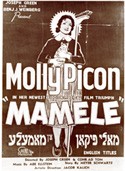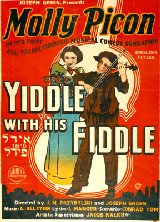The Cantor's Son (Dem Khazns Zundl) United States. 1937. 90 minutes. Musical drama. The reverse Jazz Singer. The story of a Jewish immigrant from Poland to the U.S. who becomes a successful and well-known singer and then returns to Poland to his family and childhood girlfriend. Contains the famous Yiddish 'Mayn Stetele Betz.' (My Little Village Betz)
The Cowboy United States. 1968. 11 minutes. A bizarre little movies. An old Western was dubbed into Yiddish with hilarious dialogue.
Green Fields. (Grine Felder) United States. 1937. 95 minutes. Drama. The most critically acclaimed American Yiddish film. Winner of the Best Foreign Film Award in France in 1938. The story of a traveling scholar who travels through Lithuania in search of 'true Jews.'
The Jester. (Der Purimspiler) Poland. 1937. 90 minutes. Drama. The story of a lonely wanderer and the daughter of the town's shoemaker, who tries to marry her off into a wealthy family. Contains lively Jewish vaudeville music and set pieces. Most of the film's crew and actors were killed in the Holocaust.
Jolly Paupers. (Freylekhe Kabtsonim). Poland. 1937. 62 minutes Musical comedy. The famous Jewish comic duo Dzigan and Shumacher believe that they have struck oil in a local field. The whole town finds out leading to a comedy of error, including millionaire investors, American schemers, and insane asylums.
A Letter From Mama. (A Brivele Dr Mamen) Poland. 1939. 105 minutes. Drama. One of the last Yiddish films made in Poland before the Nazi invasion, the film tells the story of a mother's persistent efforts to support her family. While her husband lives in America, Dobrish struggles to care for her three children in pre-WWI Polish Ukraine. After her family is pulled apart by severe poverty and the turmoil of war, Dobrish and her family make their way to New York and turn to the Hebrew Immigrant Aid Society (HIAS) in search of a brighter future. Released on September 14, 1939, two weeks after the German blitzkrieg over Poland, this film opened to packed audiences at the Belmont Theater in New York. Hailed by the New York Times as one of the best Yiddish films to reach America, A Letter to Mother was the highest grossing Yiddish film of its time.
The Light Ahead. (Fishke the Lame) United States. 1939. 94 minutes. Drama. Impoverished and disabled lovers Fishke and Hodel dream of life in the big city of Odessa, where they will be free from poverty and where they imagine there is no anti-Semitism. Made on the eve of World War 2, the movie is painfully conscious of the danger about to engulf the Jews of Eastern Europe.
 Mamale. (Little Mother) Poland. 1938. 100 minutes. Musical comedy. A wonderful musical comedy with upbeat songs, nightclubs, unemployed Jews, gangsters, and religious Jews celebrating Sukkot. Includes Molly Picon's trademark theme song 'Abi Gezunt.' Set in Lodz, the film revolves around Khavtshi Samet (Picon), a Cinderella figure, who has taken on maternal responsibility for her family after the death of her mother Ñ hence the title, Mamele, or 'little mother.' Khavtshi is required to shop, cook and clean up after her unappreciative family. Furthermore, she must keep her siblings out of trouble: her younger brother gets mixed up with crooks and her sister Berta has eyes for the gangster Maks Katz. Eventually Khavtshi's morale breaks, and she moves in with the handsome musician Schlesinger across the courtyard. In this period of distress Khavtshi imagines the life of her grandmother in a dream-like song and dance sequence. The Samet family begs for Khavtshi to return, which she does with Schlesinger. The film closes with Khavtshi busy preparing the feast during her wedding.
Mamale. (Little Mother) Poland. 1938. 100 minutes. Musical comedy. A wonderful musical comedy with upbeat songs, nightclubs, unemployed Jews, gangsters, and religious Jews celebrating Sukkot. Includes Molly Picon's trademark theme song 'Abi Gezunt.' Set in Lodz, the film revolves around Khavtshi Samet (Picon), a Cinderella figure, who has taken on maternal responsibility for her family after the death of her mother Ñ hence the title, Mamele, or 'little mother.' Khavtshi is required to shop, cook and clean up after her unappreciative family. Furthermore, she must keep her siblings out of trouble: her younger brother gets mixed up with crooks and her sister Berta has eyes for the gangster Maks Katz. Eventually Khavtshi's morale breaks, and she moves in with the handsome musician Schlesinger across the courtyard. In this period of distress Khavtshi imagines the life of her grandmother in a dream-like song and dance sequence. The Samet family begs for Khavtshi to return, which she does with Schlesinger. The film closes with Khavtshi busy preparing the feast during her wedding.
Man, God, & The Devil. (Got, Mentsh, un Tayvl) USA. 1949. 100 minutes. A wager between God and Satan has dire consequences in this allegory based on the play by Jacob Gordin about the material world's false promises. Beware when money sounds sweeter than music, it cautions; those who win lotteries stand to lose all, including their spiritual treasures, families, communities and religion. Poor, pious Torah scribe Hershele Dubrovner has a life that glorifies God until Satan, disguised as a business partner, turns him into a greedy, dishonest factory owner whose success desecrates both his religion and his community. Betrayal and abandonment replace serenity and familiarity; the instruments of good fortune become instruments of death. Not even music, previously Hershele's joy, can heal these rifts.
Tevye. (Tevye the Milkman) (Tevye der Milkhiker) United States. 1939. 96 minutes. Drama. Tevye is the central character in a number of stories by Sholem Aleichem. This movie centers on Chave, one of Tevye's daughters. Chave marries a Christian and is shunned by Tevye, who cannot accept the marriage. The Tevye stories later became the basis for 'Fiddler on the Roof.'
Unser Kinder. (Our Children) Poland. 1948. 68 minutes. Drama and comedy. My personal favorite Yiddish film. The last Yiddish film ever made in Poland. Features the famous Yiddish comedy duo Shimon Dzigan and Israel Shumacher, who play all the parts in a Sholem Aleichem story staged for an audience of children who had survived the Holocaust. Both funny and grim, the children tell stories of their experiences during the Nazi occupation of Poland. This semi-documentary film was Poland's last Yiddish feature film. Directed on location by Nathan Gross and Shaul Goskind at at the JDC-supported Helenowek Colony and an orphanage and school near Lodz, Reversals continue during the performers' visit to the children's residence, as the children teach adults about the healing possibilities of music, dance and storytelling.
 Yiddle With His Fiddle. (Yidl Mitn Fidl) Poland. 1936. 92 minutes. Comedy. The most financially successful Yiddish film ever made. Starring Molly Picon, the top comedienne of Yiddish movies, theater, and vaudeville. This is the classic folk comedy about a man and his daughter who, penniless, decide to become travelling musicians. The daughter disguises herself as a boy to relieve her father's anxiety about unforseeable problems that could befall a young woman "out in the world." They then join together with "another" father-son duo for music, comedy and romance. Yiddle became the basis of several later Hollywood movies, including 'Yentl' starring Barbara Streisand.
Yiddle With His Fiddle. (Yidl Mitn Fidl) Poland. 1936. 92 minutes. Comedy. The most financially successful Yiddish film ever made. Starring Molly Picon, the top comedienne of Yiddish movies, theater, and vaudeville. This is the classic folk comedy about a man and his daughter who, penniless, decide to become travelling musicians. The daughter disguises herself as a boy to relieve her father's anxiety about unforseeable problems that could befall a young woman "out in the world." They then join together with "another" father-son duo for music, comedy and romance. Yiddle became the basis of several later Hollywood movies, including 'Yentl' starring Barbara Streisand.
Mark Tarses